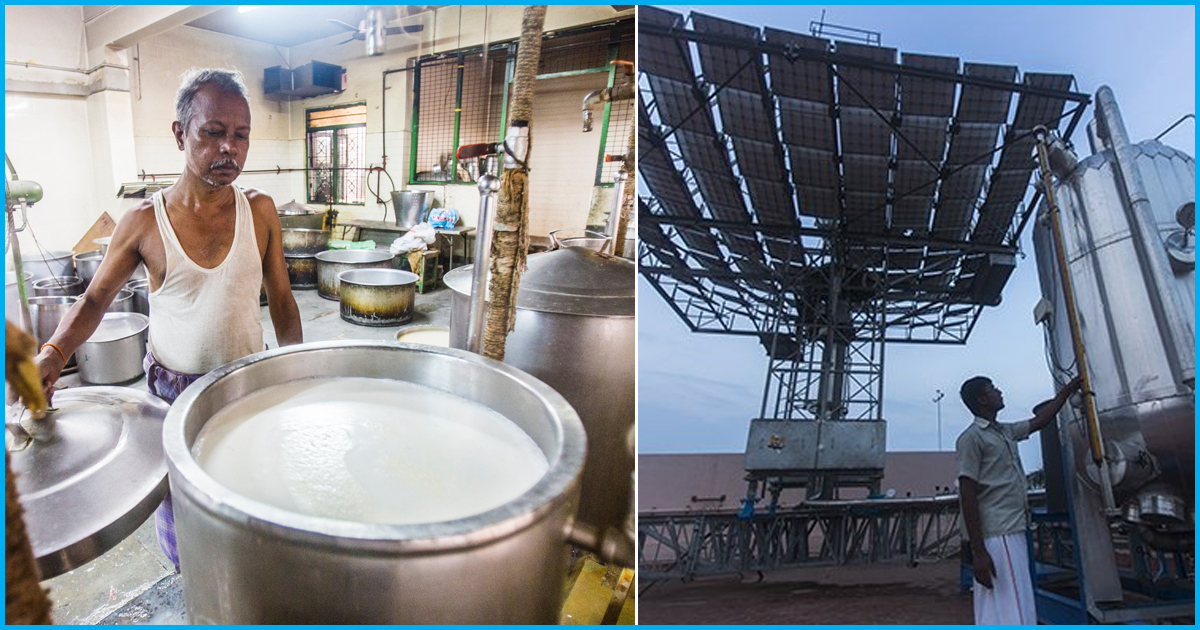Chennai: This Man Cooks 120 Kilos Of Rice Every Meal For 650 Underprivileged Children With A Solar Steam System
29 Aug 2018 7:18 AM GMT
There’s just half-an-hour to go before 650 hungry boys come flocking in for lunch. The atmosphere in any other kitchen would have been frenetic, but Raja, head cook at the Ramakrishna Mission’s Students’ Home, Chennai, has everything under smiling control. Raja cooks a whopping 120 kilos of rice every meal to cater to the healthy young appetites of the residential school that takes in orphaned and destitute boys. It’s a job efficiently done, thanks to an innovative solar steam cooking system.
In 2013, the 109 year-old charitable institution located in an iconic building in the South Indian city of Chennai invested in a solar heating system that could fuel its kitchens, replacing fossil fuel with a clean, alternative source of energy captured from the sun.

Highlights
- UNDP in partnership with the Ministry of New and Renewable Energy, Government of India is supporting the RK Mission Home, Chennai in setting up a solar concentrated heating system that allows it to cook 3000 meals a day.
- Solar powered cooking systems are feeding more than 10 million people annually.
- The RK Mission Home for orphaned and under privileged boys has been able to halve consumption of liquefied petroleum gas, reducing expenditure by about US$ 8,000 every year.
- ARUN®100 installed on the grounds of the institution is designed to capture the maximum heat of the sun and use it to continuously turn water into steam, which is piped to an accumulator and from there to the kitchen.
- Over the next three years, the project aims to install 45,000 square metres of concentrated solar technology based systems across India saving 39,200 tonnes of CO2 emissions and 3.15 million litres of fuel oil each year.
- The project is financed by the Global Environment Facility.
The solar heating system was supported through a partnership between the United Nations Development Programme and the Ministry of New and Renewable Energy, Government of India which promotes the use of concentrated solar heating technology in a range of industries, commercial establishments, religious and philanthropic institutions. The project is financed by the Global Environment Facility.

Solar powered cooking systems such as those installed at the R.K. Mission are feeding more than 10 million people. Over the last two years, the rate of installation of solar concentrated heating systems has more than doubled in the country.
ARUN®100 installed on the grounds of the charitable institution is cleverly designed to capture the maximum heat from the sun and use it to continuously turn water into steam, which is piped to an accumulator and from there to the kitchen. The accumulator is a key innovation here, allowing for unused steam to be stored in a large insulated storage tank as high pressured hot water.
https://twitter.com/UNDP_India/status/1034308236931817472?s=19
Maintenance is simple. Two young men, Vinod and Sunil, clean the reflector mirrors once in two days to ensure the best performance. Web-based data logging equipment installed through a grant from the project helps remote monitoring of energy generated. Computerized monitoring of parameters helps ensure the systems ae run optimally, and safety features guarantee risk-free operation.

The UNDP and Government of India partnership is providing support to institutions such as the RK Mission Home to encourage wider spread use of the technology which has proved immensely popular for in community cooking. Over the last two years, the rate of installation of solar concentrated heating systems has more than doubled. Over the next three years, the project aims to install 45,000 square metres of concentrated solar technology based systems across India saving 39,200 tonnes of CO2 emissions saving 3.15 million litres of fuel oil each year.

Support in the form of technical assistance has made for a smoother transition for institutions in replacing fossil fuel with solar energy. ARUN®100 was easily integrated into the existing steam-cooking system at the RK Mission. “We’re fully satisfied,” says Br. Chandrasekaran. “We have considerably reduced dependence on fossil fuels and there’s no pollution”.
His sentiments are echoed by Swami Satyajnanananda, Students’ Home Secretary: “The satisfaction we derive from putting previously wasted solar energy to good use is immense. Also, we have been able to expose our young students to environment-friendly technology, something very important for the future of the world.”
Published with the permission from UNDP India
 All section
All section














